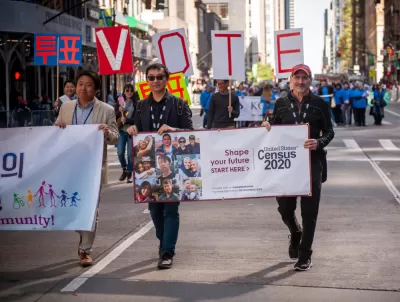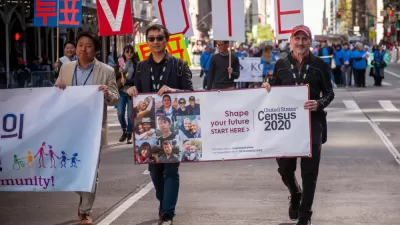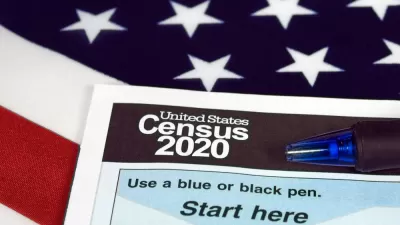There are a number of obstacles and issues related to the 2020 Census enumeration of apartment building residents. This set of FAQs covers “Census Information for Rental Property Owners.”

There are a number of obstacles and issues related to the 2020 Census enumeration of apartment building residents. This set of FAQs covers “Census Information for Rental Property Owners.”
Landlords and building managers need to know:
Why is the Census important?
Census data guide distribution of government resources, services and infrastructure investment. Every year, billions of dollars from the federal budget are distributed to communities — for education, transportation, housing and health — with amounts determined from population data.
How does the Census work? When does it happen?
By April 1, 2020, all residential addresses will receive 2020 Census materials in the mail. Residents should fill out their Census questionnaire as soon as possible, either online or by mail. Both forms of responses are accepted.
The 2020 Census is not something that households can ignore. Residents who do not respond to the first mailing will receive four additional mailings.
Starting in May, Census workers will begin calling on addresses that continue to have a “non-responding” status. These follow-up visits will take place through August 2020.
What if an occupied apartment or unit does not receive any Census materials?
Landlords and building managers can assist the 2020 Census by letting residents know that Census materials should arrive by April 1, 2020. If not, people can still complete the 2020 Census through a secure, online questionnaire at 2020census.gov.
Who needs to be counted in my apartment building?
Everyone counts — and the Census Bureau wants to count everyone at the right place. The general rule: People should report themselves living at their usual place of residence.
How can you verify that someone is a Census worker?
Landlords and building managers should always verify that Census workers have a photo ID badge. The badge will have the Census worker’s name, photograph, and a US Department of Commerce watermark.
If you still have questions, you can call the Census Bureau at 800-923-8282.
What might a Census worker ask of a landlord or building manager?
Mostly, Census workers will need to enter building hallways, knock on apartment doors, or buzz apartment call boxes. They will ask whether addresses on their lists were occupied or vacant on April 1, 2020.
Census workers may ask for residents’ names, phone numbers and usual hours at home. Landlords and building managers must cooperate and provide known information if Census workers ask.
If Census workers are unsuccessful communicating with residents, they may ask detailed questions about who lives in specific units, their names, relationships to one another, races and ages. The Census Bureau considers response by a landlord to be a last resort — but it is a valid request if contact with residents has failed.
Is answering the Census required?
Participation in the Census is required by federal law. Census workers are empowered by federal law to ask for any of the information listed on the Census questionnaire (13 U.S.C. § 221 and 223). They do not need a court order for this work.
Are there privacy issues to consider?
Providing information to Census workers is not a violation of anyone’s privacy rights. Federal law requires that landlords and building managers cooperate to the extent they are able.
Federal law also requires that landlords or building managers provide reasonable access to buildings. If a person refuses to cooperate, refuses access, or otherwise impedes a Census worker, the Census Bureau can take legal action. Refusing to provide information or impeding a Census worker is a federal offense that can lead to a fine of up to $500.
What do the Census Bureau and federal law consider to be reasonable access to buildings?
Landlords and building managers must allow Census workers to walk through hallways, knock on apartment doors, or buzz apartment call boxes. Census workers will need time and space to conduct interviews. Census workers may have to return multiple times to secure interviews. These repeat visits must be accommodated.
FULL STORY: HRA Owner/Landlord Information: Census Information for Rental Property Owners

Alabama: Trump Terminates Settlements for Black Communities Harmed By Raw Sewage
Trump deemed the landmark civil rights agreement “illegal DEI and environmental justice policy.”

Study: Maui’s Plan to Convert Vacation Rentals to Long-Term Housing Could Cause Nearly $1 Billion Economic Loss
The plan would reduce visitor accommodation by 25% resulting in 1,900 jobs lost.

Planetizen Federal Action Tracker
A weekly monitor of how Trump’s orders and actions are impacting planners and planning in America.

Wind Energy on the Rise Despite Federal Policy Reversal
The Trump administration is revoking federal support for renewable energy, but demand for new projects continues unabated.

Passengers Flock to Caltrain After Electrification
The new electric trains are running faster and more reliably, leading to strong ridership growth on the Bay Area rail system.

Texas Churches Rally Behind ‘Yes in God’s Back Yard’ Legislation
Religious leaders want the state to reduce zoning regulations to streamline leasing church-owned land to housing developers.
Urban Design for Planners 1: Software Tools
This six-course series explores essential urban design concepts using open source software and equips planners with the tools they need to participate fully in the urban design process.
Planning for Universal Design
Learn the tools for implementing Universal Design in planning regulations.
Caltrans
Smith Gee Studio
Institute for Housing and Urban Development Studies (IHS)
City of Grandview
Harvard GSD Executive Education
Toledo-Lucas County Plan Commissions
Salt Lake City
NYU Wagner Graduate School of Public Service





























